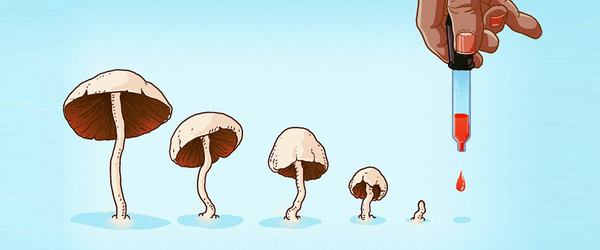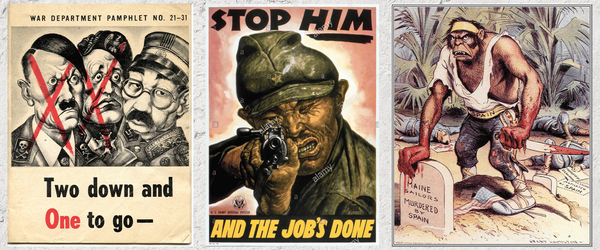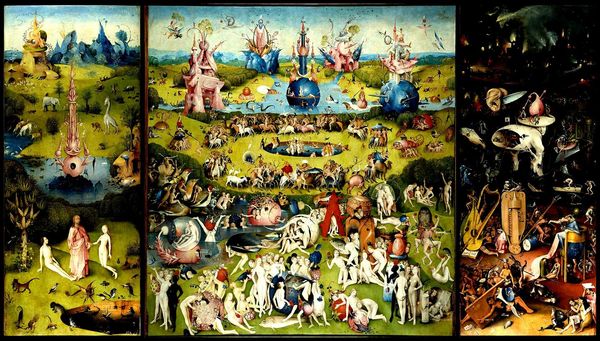Jon Brooks • • 29 min read
What Is Propaganda? Noam Chomsky on Media, Manipulation, and Democracy
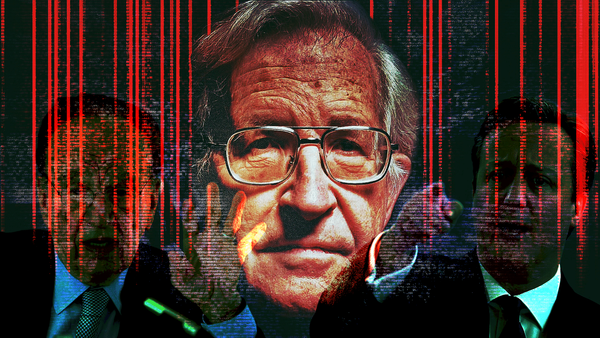
When you hear the word “intellectual,” who is the first person that comes to mind?
For me, that person is Professor Noam Chomsky: linguist, philosopher, cognitive scientist, historian, logician, social critic, political activist, and author of over 100 books.
In this article, I will be dissecting Noam Chomsky’s book Media Control: The Spectacular Achievements of Propaganda, in an attempt to answer five questions:
- What is a democracy and how does it function?
- What is propaganda and why does it exist?
- How is our behaviour being shaped by the media?
- Who are controlling things behind the scenes?
- How can we defend ourselves against malicious propaganda campaigns?
Chomsky’s thoughts on propaganda and the media, if you’ve never heard them before, will fundamentally change the way you experience the modern world. Politics, the news, and political campaigns like Brexit will never seem the same again.
Are you ready to see the modern world through Chomsky’s eyes?

Part I: The Rules of Democracy
If you’re reading this, you probably live in a democracy. But what is a democracy?
George Orwell wrote in his famous essay On Politics and the English Language, with a word like democracy, “not only is there no agreed definition, but the attempt to make one is resisted from all sides.”
While Orwell is correct about the definition of “democracy” being harder for all to agree on than the definition of a word like “triangle,” it’s fair to say that many of us have a sense of what a democracy is. I suspect this is because we know exactly what a democracy is not: North Korea or Nazi Germany for example.
Chomsky begins Media Control with two counterposing definitions of democracy. Out of these, which sounds more like a democracy to you?
Democracy version #1: The public must be allowed to participate in a meaningful way in the management of their own affairs, and the means of information are open and free.
Democracy version #2: The public must be barred from managing their own affairs, and the means of information are kept narrowly and rigidly controlled.
If you read Democracy version #2 and thought it didn’t sound like a democracy, you’re right… and you’re wrong. In fact, according to Chomsky this version of democracy is the “prevailing conception, both in theory and operation…” But how can Democracy version #1 and #2 both be right and wrong?
Democracy appears differently depending on which role you play in society.
The Inception of Modern Propaganda and the Hidden Class System
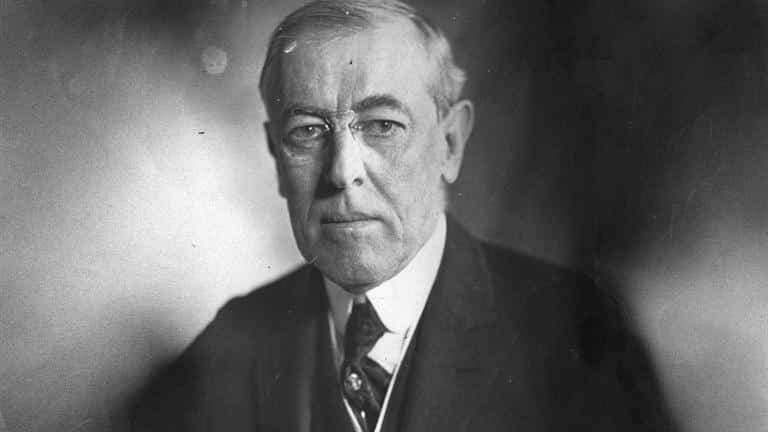
The first successful propaganda campaign carried out by a modern government took place under the Woodrow Wilson Administration. Wilson was elected President in 1916, during the middle of World War I. The population at the time was predominantly pacifist and saw no reason to get caught up in a European war. But the government wanted involvement and needed the consent of the American people.
Wilson’s government established a propaganda campaign called the Creel Commission which Chomsky says, “succeeded, within six months, in turning a pacifist population into a hysterical, war-mongering population which wanted to destroy everything German, tear the Germans limb from limb, go to war and save the world.”
How did the Wilson Administration do this? Well, it’s far less sophisticated than one might think: propaganda is just strategic storytelling – drama – and these are the three acts from which the play proceeds:
- Terrify the population by fabricating and spreading narratives which frame the enemy as mad brutes who feast on flesh and liberty.
- Hammer the point to the home front by including women and children getting massacred, and circulate shocking stories that are too offensive not to share.
- In the midst of the ensuing hysteria, remind people about the army and how you – yes you – can help to eradicate the world’s cancerous threats.
Stir this propaganda concoction for about six months and you have yourself a nation ready to wage war.
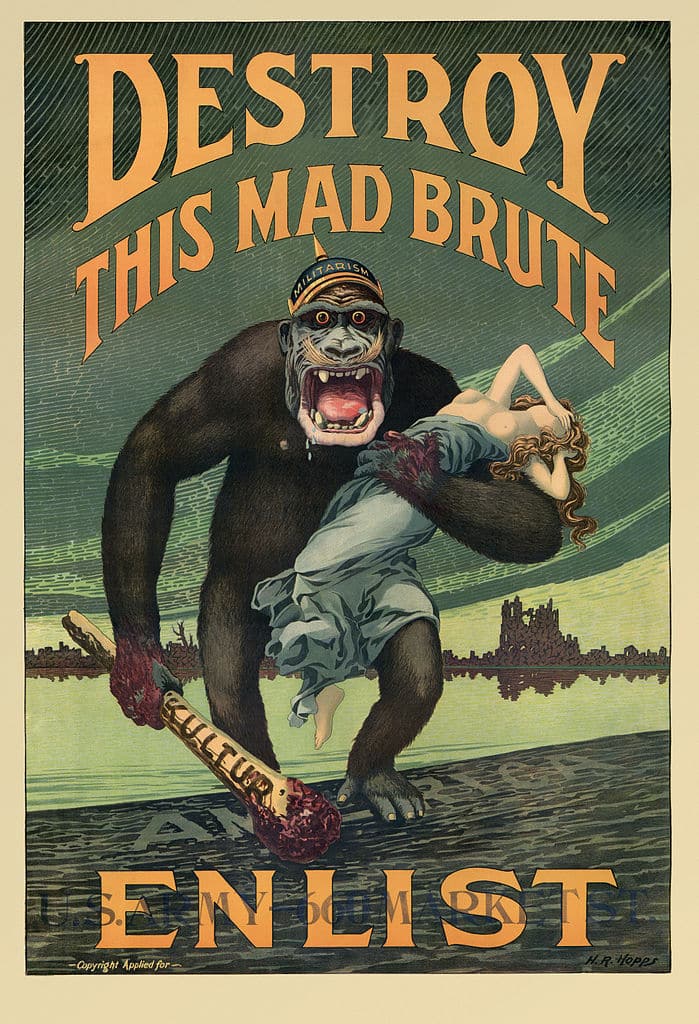
One might think that the target audience for state propaganda is the uneducated, the naive. Not so. The educated members of society are typically the most influential, making them ideal disseminators of ideas. Chomsky says that the targeting of educated citizens in propaganda campaigns “was a lesson learned by Hitler and many others, and it has been pursued to this day.”
Walter Lippmann, who was the dean of American journalists and a major theorist of liberal democracy, was involved in the Creel Commission and similar campaigns which followed. Lippmann thought that the use of propaganda techniques to influence the public was not merely acceptable, but necessary. Chomsky explains:
As he put it, “the common interests elude public opinion entirely” and can only be understood and managed by a “specialized class “of “responsible men” who are smart enough to figure things out. This theory asserts that only a small elite, the intellectual community… can understand the common interests, what all of us care about, and that these things “elude the general public.”

Lippmann backed up this view with an elaborate theory of democracy, in which he divides citizens into two groups:
1) The bewildered herd:
These consist of everyone who is not part of the specialized class. The bewildered herd are the spectators. They may moan about the state of things a little, but their power to make a significant change is limited. The bewildered herd believes they live inside Democracy version #1.
2) The specialized class:
These are the people who analyze, execute, make decisions, and run things in the political, economic, and ideological systems. The specialized class make up a small percentage of the population, and their biggest objective is to tame the bewildered herd by enforcing Democracy version #2. Chomsky summarizes Lippmann’s views on how these two groups interact as follows:
There are two “functions” in a democracy: The specialized class, the responsible men, carry out the executive function, which means they do the thinking and planning and understand the common interests. Then, there is the bewildered herd, and they have a function in democracy too. Their function in a democracy, he said, is to be “spectators,” not participants in action. But they have more of a function than that, because it’s a democracy. Occasionally they are allowed to lend their weight to one or another member of the specialized class. In other words, they’re allowed to say, “We want you to be our leader” or “We want to be a leader.” That’s because it’s a democracy and not a totalitarian state. That’s called an election. But once they’ve lent their weight to one or another member of the specialized class they’re supposed to sink back and become spectators of action, but not participants. That’s in a properly functioning democracy.
Now before concluding that all politicians and propagandists are sadists seeking ultimate control over everyone, consider the rationale behind Lippmann’s concept of democracy. The specialized class could argue that they are doing the right thing by protecting the stupid, bewildered herd from stampeding all over each other. Chomsky continues:
It’s pretty much the same logic that says that it would be improper to let a three-year-old run across the street. You don’t give a three-year-old that kind of freedom because the three-year-old doesn’t know how to handle that freedom. Correspondingly, you don’t allow the bewildered herd to become participants in action. They’ll just cause trouble.
But, there’s another question here-an unstated premise-how does one get entry into the specialized class? It’s really quite simple says Chomsky. To get accepted into the specialized class you just serve the people who have real power.
Who Owns the Specialized Class?
The media magnate Rupert Murdoch is a person with real power. He is a man who owns and controls a much larger chunk of society than most. Currently, the companies Murdoch own include Fox News, National Geographic U.S., Twentieth Century Fox Film, New York Post, and British newspapers The Sun and The Times.
According to Chomsky, if aspiring members of the specialized class can come along and serve the interests of people like Rupert Murdoch – people with real power – then they’ll be granted access to the “executive group.”
It sounds a bit like a conspiracy, but it’s not.
The current British prime minister, David Cameron[1], the leader of the UK’s specialized class, is connected to Rupert Murdoch: in 2008, Cameron was bought flights to Greece by Murdoch’s son-in-law and had drinks on a yacht with Rupert Murdoch in Greece, and Rebekah Brooks’ (CEO of Murdoch’s News UK) wedding reception was held at Jeremy Clarkson’s house with guests David Cameron, George Osborne, Rupert Murdoch, James Murdoch, and Elisabeth Murdoch.[2]
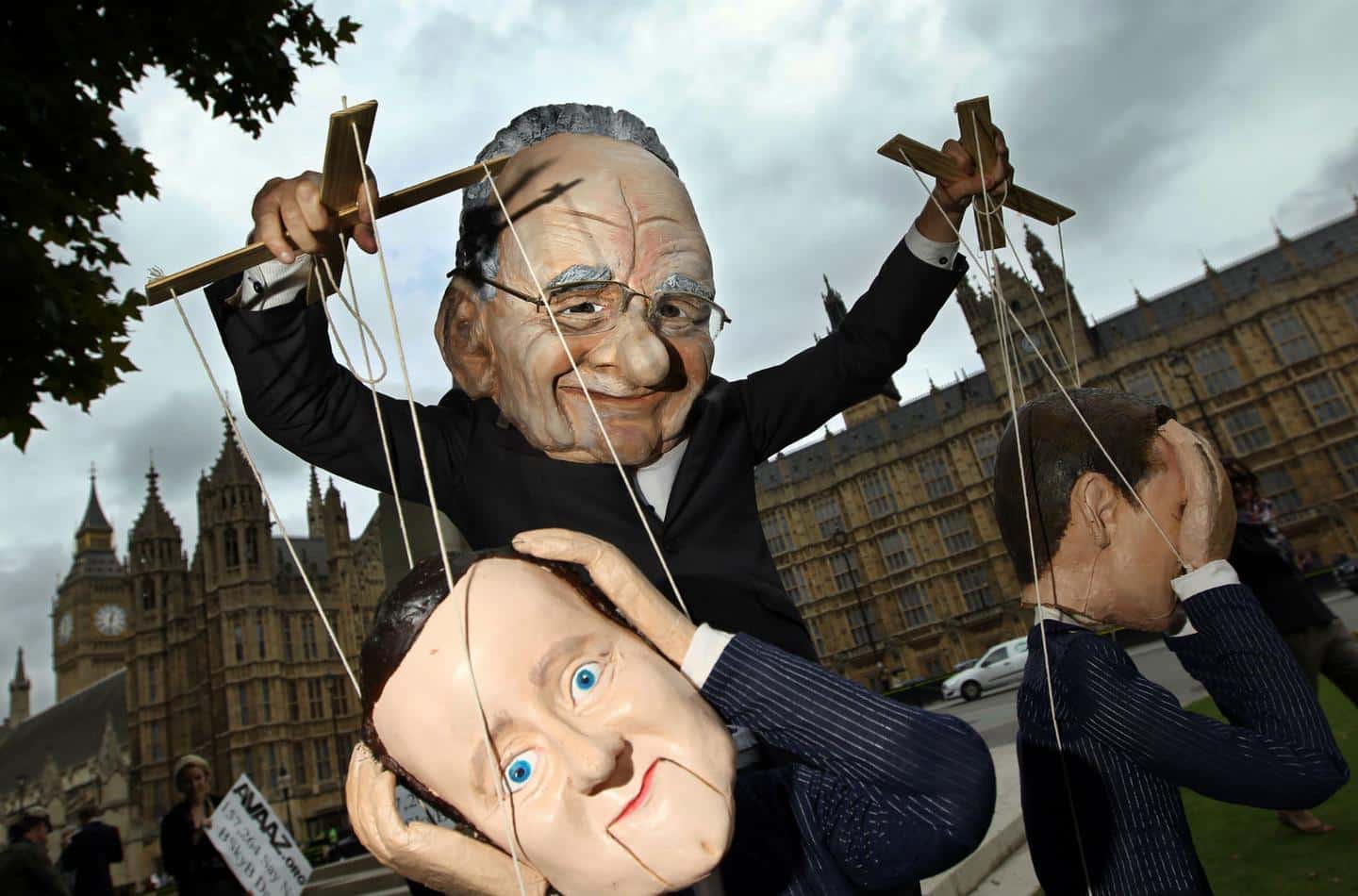
Chomsky says that if you plan on serving the interests of the people with real power rather than the bewildered herd, you have to keep that secret, which means the specialized class:
…have to have instilled in them the beliefs and doctrines that will serve the interests of private power … So we have one kind of educational system directed to the responsible men, the specialized class. They have to be deeply indoctrinated in the values and interests of private power and the state-corporate nexus that represents it. If they can achieve that, then they can be part of the specialized class.
This is where things get weird.
Chomsky is saying that the specialized class are conditioned from a young age to share the same values as private power.
Surely this can’t be true, can it?
Let’s look at David Cameron’s education. This is an image of 17-year-old Cameron in his Eton school.
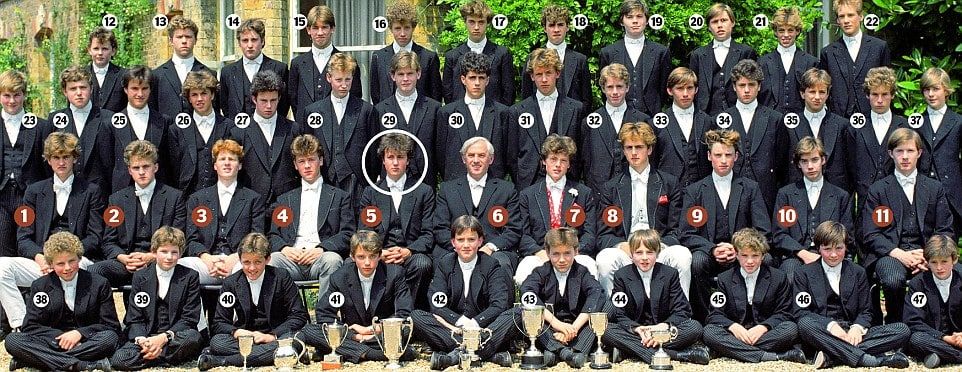
The Mail Online tracked down Cameron’s schoolmates to see what they all now do for a living. We’ll focus on the ten students in Cameron’s row. Compare their jobs to those who went to your school:
- Campbell Clarke: a hugely successful financier, he’s the founder and managing director of Astir Capital, a company that’s raised $1 billion of capital for hedge funds and business development projects.
- Tom Goff: leading figure in British horse racing, and Chairman of Blandford Bloodstock in Newmarket, which he co-founded.
- Simon Andrea: leading international TV producer, he was most recently executive vice president at Fox TV in America (owned by Murdoch), in charge of its reality show division.
- James Learmond: a millionaire who founded the health food and juice bar chain Crussh.
- David Cameron: British prime minister since 2010.
- Roland Watson: political editor of The Times (owned by Murdoch).
- Ed Clarke: founder/director of Infracapital, a Project & Infrastructure Finance business that’s part of the global finance giant M&G.
- Charles Todhunter: venture capitalist.
- Crispin Gibbs: owner of the luxury Black Marlin scuba dive centre and holiday resort on Kadirir Island.
- Peter Davis: conductor and Director of the Westminster Chamber Orchestra and the National Preparatory School Orchestra.
Eton is no ordinary school; it’s a golden ticket into the specialized class. But maybe Cameron’s year was just an anomaly – an unusually successful bunch. That’s reasonable idea to entertain, until you become aware of this fact: Eton College, a regular-sized school which educates about 1,300 pupils, has produced nineteen prime ministers since it opened.
The Totalitarian Democracy
The uses of propaganda extend far beyond wartime ambivalence. Propaganda is the lifeblood of “democracy.” The common interests elude the bewildered herd, so how do you get these irrational creatures to act in the appropriate way? Chomsky explains:
In what is nowadays called a totalitarian state, or a military state, it’s easy. You just hold a bludgeon over their heads, and if they get out of line you smash them over the head. But as society has become more free and democratic, you lose that capacity. Therefore you have to turn to the techniques of propaganda. The logic is clear. Propaganda is to a democracy what the bludgeon is to a totalitarian state. That’s wise and good because, again, the common interests elude the bewildered herd. They can’t figure them out.
The problem with the bewildered herd is that it can never truly be tamed, only contained. And so propaganda – the whip of the lion tamer, the bludgeon of the dictator – must be ever-present. Up to this point, we’ve learned about the prevailing conception of democracy, the first modern uses of propaganda, and the symbiotic relationship between the political class and private power. In the next part, we explore the seven ways propaganda is used and infused in society to numb the herd into reluctant obedience.
Part II: The Framework of Bewilderment
1) Falsifying History
How many Vietnamese casualties would you estimate occurred during the Vietnam war?
This question was asked to participants in a study at the University of Massachusetts on beliefs and attitudes in television watching.
The official figure is about two million. The actual figure is likely three to four million. The average response by the Americans that were asked the question was about one hundred thousand. This is the result of a successful attempt to falsify history on the part of the American media. But what would the media gain from falsifying history like this? Chomsky says:
There has been a huge effort since the Vietnam war to reconstruct the history of that. Too many people began to understand what was really going on. Including plenty of soldiers and a lot of young people who were involved with the peace movement and others. That was bad. It was necessary to rearrange those bad thoughts and to restore some form of sanity, namely, a recognition that whatever we do is noble and right. If we’re bombing South Vietnam, that’s because we’re defending South Vietnam against somebody, namely, the South Vietnamese, since nobody else was there. It’s what the Kennedy intellectuals called defense against “internal aggression” in South Vietnam. That was the phrase used by Adlai Stevenson and others. It was necessary to make that the official and well understood picture. That’s worked pretty well. When you have total control over the media and the educational system and scholarship is conformist, you can get that across.
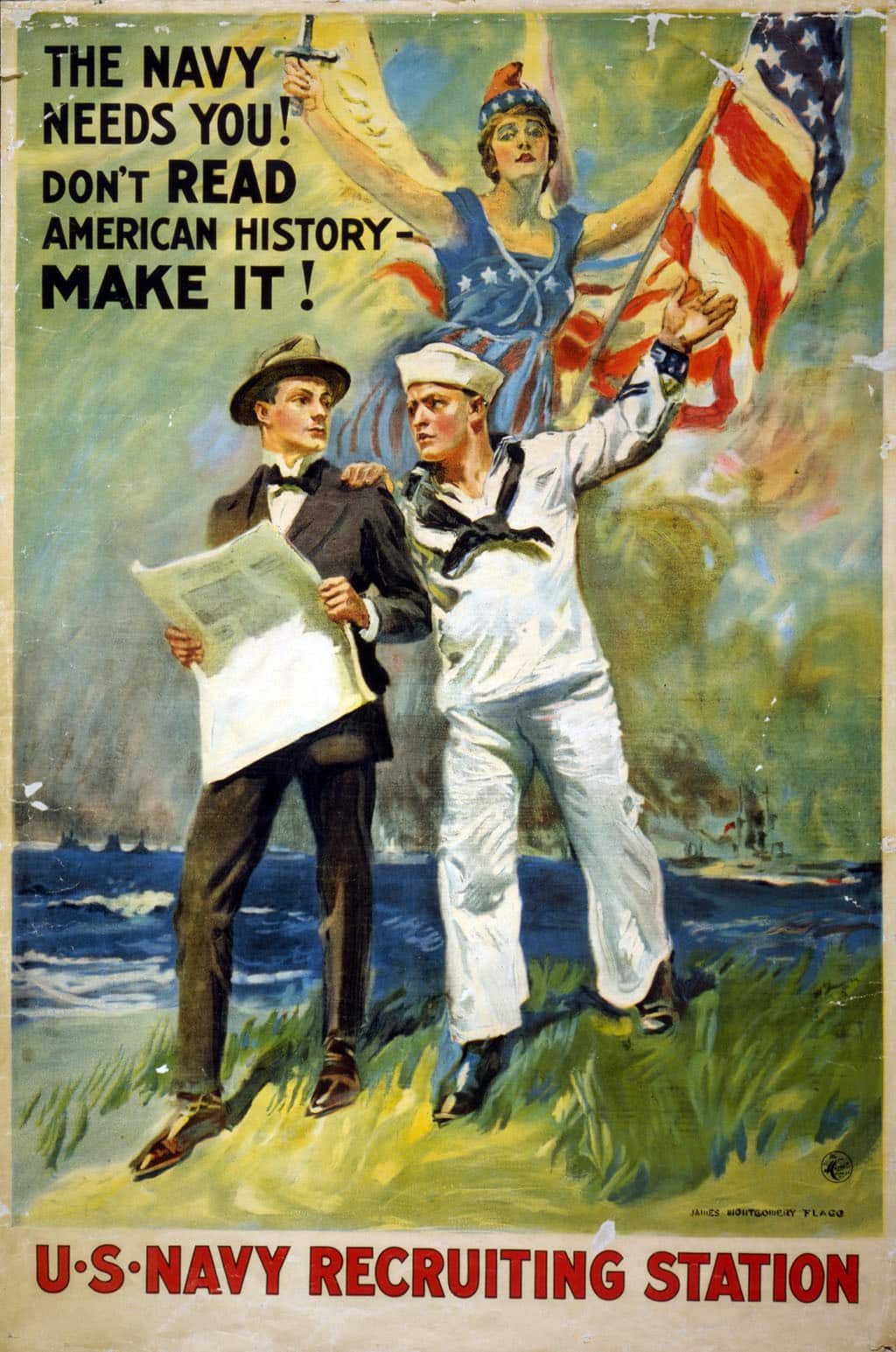
Propaganda defense #1: Read history
How many people do you know who have strong opinions about politics or world affairs but don’t have any historic knowledge to give a reliable context to their beliefs? To avoid this ignorance trap, take an interest in history. Research various sources and always look for criticisms against a particular view. Historians don’t always agree, but this is good: it makes you think for yourself. A fun place to start is Dan Carlin’s amazing Hardcore History podcast and Will Durant’s Complete History of Civilization.
2) Promoting Spectatorism over Heroism
Earlier Chomsky said the specialized class are indoctrinated from a young age with a set of values which are different from the values of the bewildered herd. If you look at the jobs of David Cameron’s school friends, one value difference becomes apparent:
Spectatorism vs. heroism, creation vs. consumption, cause vs. effect.

They don’t teach the pupils at Eton college to be proficient at consuming information, buying stuff, and distracting themselves. They teach them to create, to step up, to be at the cause rather than at the effect, to be the spectated and not the spectators of society. This attitude is taught with higher priority than any particular school subject.
How many hours of TV do you think the bewildered herd watches each day compared to those in the specialized class? This is no accident, as Chomsky says:
The bewildered herd is a problem. We’ve got to prevent their roar and trampling. We’ve got to distract them. They should be watching the Superbowl or sitcoms or violent movies.
Many people would rather watch other people live a fun, exciting life than take the steps required to live one themselves. This is the basic premise of reality TV: watch normal people do stuff, experience their emotions vicariously while you sit on the sofa and drink soda. This spectatorism mindset is instilled in us from an early age via the media.
Don’t speak up. Don’t talk to strangers. Don’t be too loud. Don’t embarrass yourself. Don’t take risks. Watch TV, watch sport, cheer along, and keep up to date with the personal life of your favorite celebrity – the good-looking, rich, popular super-beings whom you will never be like, so don’t try.
Propaganda defense #2: Stop consuming and start creating
Write, draw, speak, voice your opinions. Don’t shy away from the limelight, and don’t experience your emotional highs through someone else’s life. Make your life worthy of a biography; take risks, dream, love, fail, rise. Oh, and turn off the TV.
3) Manufacturing Monsters
In 1956, the psychologist George A. Miller published a classic paper which argued that the number of objects an average human can hold simultaneously in working memory is 7 ± 2. This was a dream discovery for propagandists because it gave them a manual for distracting the human mind. If the bewildered herd are thinking about the stuff we don’t want them to think about, you can just throw some emotionally-charged information at them and they will forget what they were thinking about.
Have you ever noticed how in the media, there is often one particular population, person, or group that is “the enemy” and then after a few weeks you forget they even exist? For example, when the Paris attacks happened, everyone was talking about terrorists, Syria, war, and changing their Facebook profile pictures to resemble the French flag. Two weeks later, for most of the world it felt like the Paris attacks never happened because the media implanted a new problem in our consciousness, clearing away the old.
Chomsky deconstructs this phenomenon:
In the United States there are growing domestic social and economic problems, in fact, maybe catastrophes. Nobody in power has any intention of doing anything about them. If you look at the domestic programs of the administrations of the past ten years – I include here the Democratic opposition – there’s really no serious proposal about what to do about the severe problems of health, education, homelessness, joblessness, crime, soaring criminal populations, jails, deterioration in the inner cities – the whole raft of problems. You all know about them, and they’re all getting worse.
Chomsky explains how the government uses propaganda to prevent people from noticing the real problems:
In such circumstances you’ve got to divert the bewildered herd, because if they start noticing this they may not like it, since they’re the ones suffering from it. Just having them watch the Superbowl and the sitcoms may not be enough. You have to whip them up into fear of enemies. In the 1930s Hitler whipped them into fear of the Jews and gypsies. You had to crush them to defend yourselves. We have our ways, too. Over the last ten years, every year or two, some major monster is constructed that we have to defend ourselves against. There used to be one that was always readily available: The Russians. You could always defend yourself against the Russians. But they’re losing their attractiveness as an enemy, and it’s getting harder and harder to use that one, so some new ones have to be conjured up.
They’ve got to keep coming up one after another. You frighten the population, terrorize them, intimidate them so that they’re too afraid to travel and cower in fear. Then you have a magnificent victory over Grenada, Panama, or some other defenseless third-world army that you can pulverize before you ever bother to look at them – which is just what happened. That gives relief. We were saved at the last minute. That’s one of the ways in which you can keep the bewildered herd from paying attention to what’s really going on around them, keep them diverted and controlled.
Propaganda defense #3: Protect your working memory.
Stop watching the news, and take every value judgment you hear from the media with a pinch of salt. Whenever you see any person or group being branded as monstrous, ask yourself: what other, more complex issue could this be distracting me from? Attempt to figure out the intentions of the so-called monster. Never lose sight of the real problems of the world. Continuously remind yourself about important issues such as ecocide, climate change, existential risks, and poverty.
If you want to make a difference, click to enlarge this image from Global Priorities Project and start here:
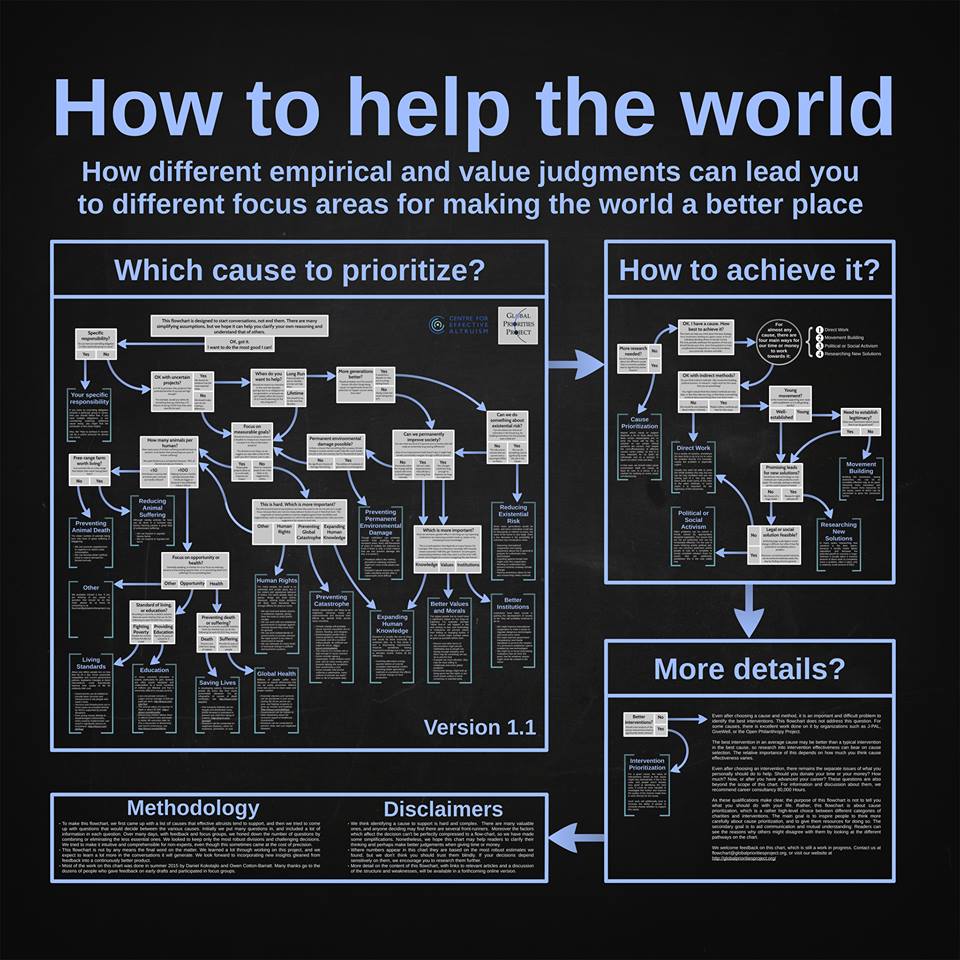
4) Crush Organizations
Ponder this scenario:
I wake up tomorrow and decide to start voicing my political opinions in the local park, the church, the street. Nothing too offensive or dangerous; I talk about bringing people together and dissolving racial hatred. At first people dismiss me as a nut-job, but after a few weeks I get a following. The following grows to a few hundred. Then a few thousand. Soon I’ve made myself into a celebrity. I have millions followers and hundreds of thousands of people show up to hear me talk about my political opinions. I’m exercising my right to free speech, and I’m bringing people together. I’m creating a movement – an organization. This is great. A democracy is about giving the people what they want, and the people really seem to be responding to my talks.
So here’s the question: would the government try to shut me down and prevent my hugely popular political talks or would they encourage them in the name of democracy?
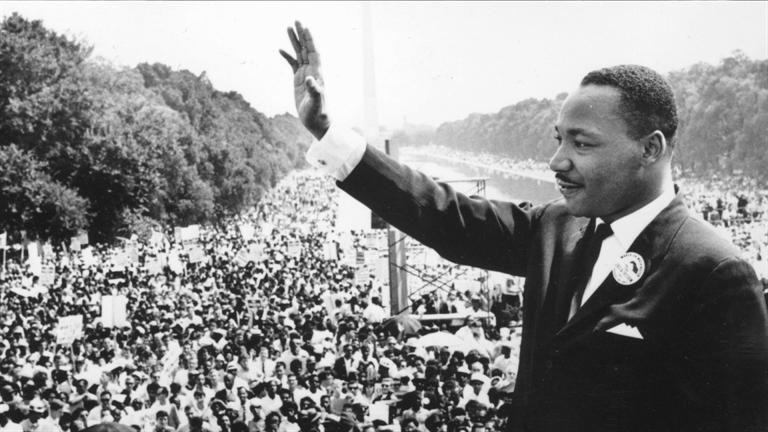
Well, it turns out I just described the political career of Martin Luther King, Jr., and it’s not dissimilar to the life stories of Jesus Christ and Socrates. Both of these men were executed by their state.
Chomsky says if there’s anything the specialized class hates, it’s when the bewildered herd organize themselves into semi-rational units:
The people in the public relations industry aren’t there for the fun of it. They’re doing work. They’re trying to instill the right values. In fact, they have a conception of what democracy ought to be: It ought to be a system in which the specialized class is trained to work in the service of the masters, the people who own the society. The rest of the population ought to be deprived of any form of organization, because organization just causes trouble. They ought to be sitting alone in front of the TV and having drilled into their heads the message, which says, the only value in life is to have more commodities or live like that rich middle class family you’re watching and to have nice values like harmony and Americanism. That’s all there is in life. You may think in your own head that there’s gotta be something more in life than this, but since you’re watching the tube alone you assume, I must be crazy, because that’s all that’s going on over there. And since there is no organization permitted that’s absolutely crucial – you never have a way of finding out whether you are crazy, and you just assume it, because it’s the natural thing to assume.
Following from the propaganda technique #3, one way the government crushes strikers, unions, and organizations is by manufacturing monsters:
We want to be together and have things like harmony and Americanism and working together. Then there’s those bad strikers out there who are disruptive and causing trouble and breaking harmony and violating Americanism. We’ve got to stop them so we can all live together.
Propaganda defense #4: Get organized
Sign petitions, join Facebook groups, connect, and organize. Set up a non-profit. Realize that bettering humanity is never down to one individual, but a group of individuals who come together with a shared vision. Make sure to be a union of love and reason to make it hard for the media to paint you as a monster.
5) Selective Perception (or Double Standards)
The power of the media resides not just in what it shows, but also in what it hides. Perception is always directed at something and consequently always directed away from something. The media, our far reaching eyes of the world, has the power to select what stories the public perceives and what stories fly right past our radar.
Chomsky illustrates selective perception with this powerful example:
In May 1986, the memoirs of the released Cuban prisoner, Armando Valladares, came out. They quickly became a media sensation. I’ll give you a couple of quotes. The media described his revelations as “the definitive account of the vast system of torture and prison by which Castro punishes and obliterates political opposition.” It was “an inspiring and unforgettable account” of the “bestial prisons,” inhuman torture, [and] record of state violence [under] yet another of this century’s mass murderers, who we learn, at last, from this book “has created a new despotism that has institutionalized torture as a mechanism of social control” in “the hell that was the Cuba that [Valladares] lived in.” That’s the Washington Post and New York Times in repeated reviews. Castro was described as “a dictatorial goon.” His atrocities were revealed in this book so conclusively that “only the most light-headed and cold-blooded Western intellectual will come to the tyrant’s defense,” said the Washington Post. Remember, this is the account of what happened to one man. Let’s say it’s all true. Let’s raise no questions about what happened to the one man who says he was tortured. At a White House ceremony marking Human Rights Day, he was singled out by Ronald Reagan for his courage in enduring the horrors and sadism of this bloody Cuban tyrant. He was then appointed the U.S. representative at the U.N. Human Rights Commission, where he has been able to perform signal services defending the Salvadoran and Guatemalan governments against charges that they conduct atrocities so massive that they make anything he suffered look pretty minor. That’s the way things stand.
That was May 1986. It was interesting, and it tells you something about the manufacture of consent. The same month, the surviving members of the Human Rights Group of El Salvador-the leaders had been killed–were arrested and tortured, including Herbert Anaya, who was the director. They were sent to a prison-La Esperanza (hope) Prison. While they were in prison they continued their human rights work. They were lawyers, they continued taking affidavits. There were 432 prisoners in that prison. They got signed affidavits from 430 of them in which they described, under oath, the torture that they had received: electrical torture and other atrocities, including, in one case, torture by a North American U.S. major in uniform, who is described in some detail. This is an unusually explicit and comprehensive testimony, probably unique in its detail about what’s going on in a torture chamber. This 160-page report of the prisoners’ sworn testimony was sneaked out of prison, along with a videotape which was taken showing people testifying in prison about their torture. It was distributed by the Marin County Interfaith Task Force. The national press refused to cover it. The TV stations refused to run it. There was an article in the local Marin County newspaper, the San Francisco Examiner, and I think that’s all. No one else would touch it. This was a time when there was more than a few “light-headed and cold-blooded Western intellectuals” who were singing the praises of Jose Napoleon Duarte and of Ronald Reagan. Anaya was not the subject of any tributes. He didn’t get on Human Rights Day. He wasn’t appointed to anything. He was released in a prisoner exchange and then assassinated, apparently by the U.S.-backed security forces. Very little information about that ever appeared. The media never asked whether exposure of the atrocities-instead of sitting on them and silencing them-might have saved his life.
This tells you something about the way a well functioning system of consent manufacturing works. In comparison with the revelations of Herbert Anaya in El Salvador, Valladares’ memoirs are not even a pea next to the mountain.
Earlier in the article, I referenced a study conducted by University of Massachusetts on beliefs and attitudes in television watching. In that study people were also asked if they thought the United States should intervene with force to reverse illegal occupation or serious human rights abuses. About 60% of the United States participants in the study thought they should use force in this situation. However, if they were to act on that belief, according to Chomsky, they would need to bomb:
- El Salvadorz
- Guatemala
- Indonesia
- Damascus
- Tel Aviv
- Capetown
- Turkey
- Washington
Chomsky explains why:
These are all cases of illegal occupation and aggression and severe human rights abuses. If you know the facts about that range of examples, you’ll know very well that Saddam Hussein’s aggression and atrocities fall well within the range. They’re not the most extreme. Why doesn’t anybody come to that conclusion? The reason is that nobody knows. In a well functioning propaganda system, nobody would know what I’m talking about when I list that range of examples. If you bother to look, you find that those examples are quite appropriate.
Propaganda defense #5: Don’t be a hypocrite
The golden rule of social harmony is “Treat others as you would like to be treated yourself.” Nobody talks about the reverse rule: “Judge yourself as you would judge others.” This reverse rule is especially important in political matters. In-group favoritism is a real thing. We tend to judge those in our group (or country) more favorably than those who we classify outside our group. Whenever you pass a judgement on another population, ask yourself: has my country or government ever acted in a comparable way?
6) Amygdala Hijacking
Amygdala hijack is a term coined by Daniel Goleman in his 1996 book Emotional Intelligence: Why It Can Matter More Than IQ. The English satirist and screenwriter behind Black Mirror, Charlie Brooker, in his television series How TV Ruined Your Life, describes what amygdala hijacking is and how it’s used by the media to control us:
Rather than use calm reason, most corrective television uses fear to hammer its message home. It’s one of the most powerful ways to grab an audience’s attention. But why? Well, for one thing, no matter how sophisticated we humans appear to be with our fancy shoes and Nintendo Wiis and what not, our brains are still cursed with a paleomammalian limbic system which the modern-iPad-owning part of us can’t control. Our fear responses are governed by twin almond-shaped clusters of nuclei known as the amygdalae, sort of primitive reactionary mind-nuts beyond the reach of human intellect… The point of the amygdalae is protection. You’re supposed to be stimulated when confronted by a loud noise or a sudden movement, because, well, it could be a lion leaping in to attack you. That’s why it’s almost impossible to ignore anything that seems like a threat – be it a lion or a scary newsreader … The amygdalae are also thought to be closely associated with memory. So if you have an unpleasant experience and your amygdalae are stimulated, an association quickly forms in your head. That’s why the man uses scare tactics to mould your behavior from an early age.
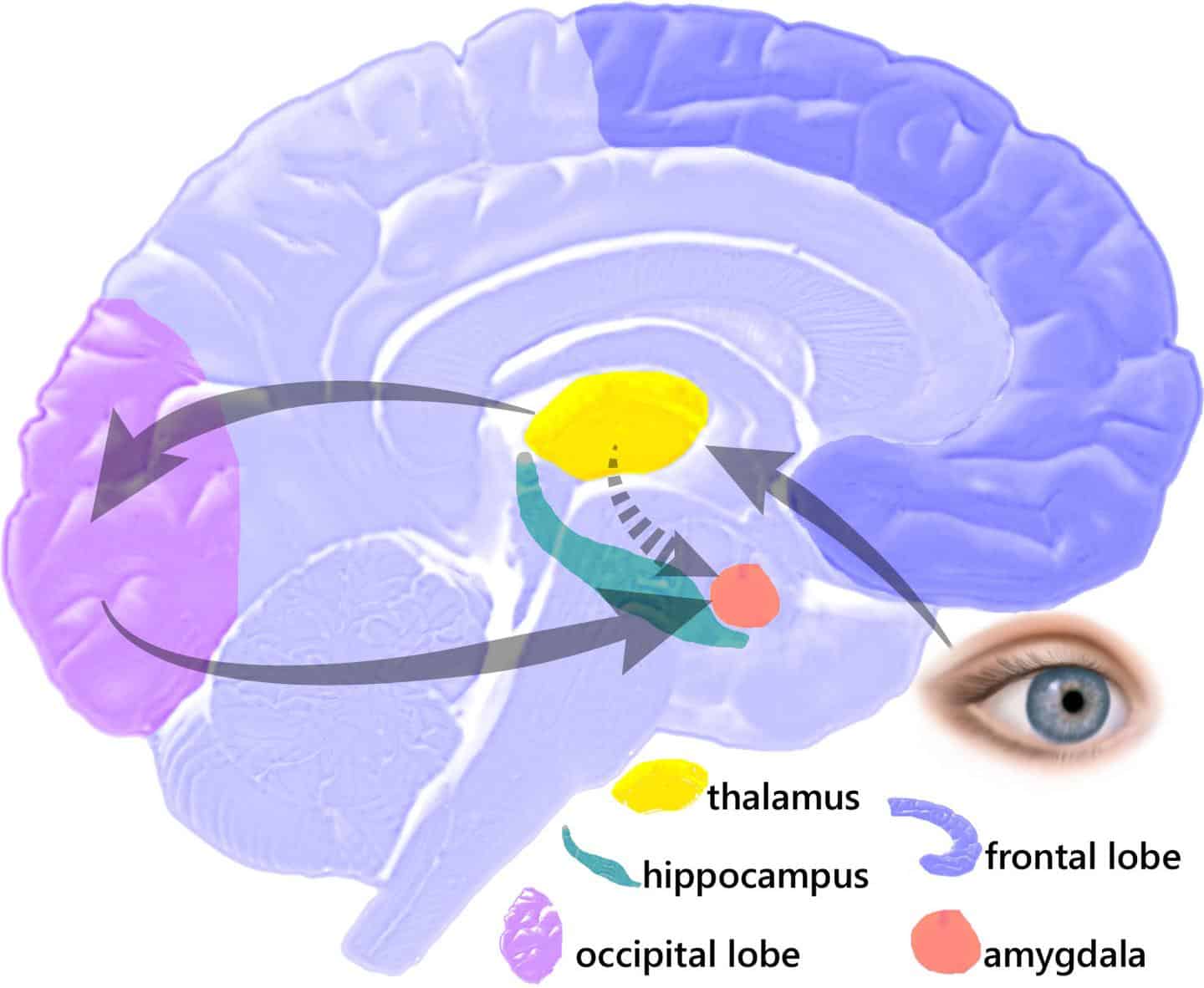
Chomsky relates amygdala hijacking back to the specialized class and the bewildered herd model of democracy:
You’ve got to keep the bewildered herd pretty scared, because unless they’re properly scared and frightened of all kinds of devils that are going to destroy them from outside or inside or somewhere, they may start to think, which is very dangerous, because they’re not competent to think. Therefore it’s important to distract them and marginalize them.
Amygdala hijacking, from the perspective of the specialized class, has four important uses:
- It keeps the bewildered herd distracted.
- It prevents the bewildered herd from thinking rationally.
- It keeps the bewildered herd reliant on the specialized class.
- It shapes the likes, dislikes, and behavior of the bewildered herd.
Amygdala hijacking is one of the worst aspects of well functioning propaganda because not only does it alter our opinions about world affairs, it also severely limits our personal potential and quality of life.
Propaganda Defense #6: Lean into your fears
The only way to defend against amygdala hijacking is to become comfortable in the face of fear. As a general rule, the more you regularly lean into your fears, the less control they will have over your behavior and the more clarity you will have over your thoughts. A great way to start leaning into your fears is to create a “fear pyramid.” To do this, draw a pyramid diagram on a piece of paper and write your most trivial fears at the bottom through to your most intense fears at the top, i.e., fear of spiders, fear of speaking to strangers, fear of heights, fear of violence. From there, start leaning into each fear, one at a time, and move up the pyramid. For more information on fear pyramids, give Geoff Thompson’s book Fear: The Friend of Exceptional People a read.
7) Empty Language and Buzz Phrases
George Orwell believed our ability to use language well is directly linked with our ability to think well, and if one suffers so will the other:
A man may take to drink because he feels himself to be a failure, and then fail all the more completely because he drinks. It is rather the same thing that is happening to the English language. It becomes ugly and inaccurate because our thoughts are foolish, but the slovenliness of our language makes it easier for us to have foolish thoughts.
If you’ve ever witnessed presidential elections, you’ll be no stranger to buzz phrases. As I write this now, Donald Trump is repeatedly spouting the buzz phrase “Make America great again” whenever he appears on TV. But what is the purpose of such a slogan? Why do politicians need buzz phrases?
Chomsky explains:
In the Persian Gulf War, one of the buzz phrases that kept being repeated by the media was “Support our troops.” But what does this mean, really? Who could be against supporting troops? – people who have put their life on the line to protect the country in which you live.
[…]
[W]hat does it mean if somebody asks you, Do you support the people in Iowa? Can you say, Yes, I support them, or No, I don’t support them? It’s not even a question. It doesn’t mean anything. That’s the point. The point of public relations slogans like “Support our troops” is that they don’t mean anything. They mean as much as whether you support the people in Iowa. Of course, there was an issue. The issue was, Do you support our policy? But you don’t want people to think about that issue. That’s the whole point of good propaganda. You want to create a slogan that nobody’s going to be against, and everybody’s going to be for. Nobody knows what it means, because it doesn’t mean anything. Its crucial value is that it diverts your attention from a question that does mean something: Do you support our policy? That’s the one you’re not allowed to talk about. So you have people arguing about support for the troops? “Of course I don’t not support them.” Then you’ve won. That’s like Americanism and harmony. We’re all together, empty slogans, let’s join in, let’s make sure we don’t have these bad people around to disrupt our harmony with their talk about class struggle, rights and that sort of business.
Propaganda Defense #7: Read George Orwell’s ideas on politics and the English language
George Orwell believed that political jargon was destroying the English language and our ability to think clearly. The seven language-sins he despised most were clichés, wordiness, passive voice, sentences saved from anti-climax, pretentious diction, meaningless words, and oversimplified descriptions of complex matters.
I wrote a 5,000-word article explaining George Orwell’s ideas on politics and the English language, while providing modern day examples. Read it here to defend yourself against political language tricks.
Part III: The Dawn of Dissidence
Despite the worrying implications of Chomsky’s musings on media, propaganda, and the political system, there is a new dawn coming.
Communities are inexorably forming due to the interconnectedness of the web. The illusion of fear is evaporating because of the improved accessibility of travel. The old school titans of media are losing power due to the expansion of independent media outlets. And the specialized class are being exposed in articles like just this one.
Chomsky writes that the embers of the counterculture movement which ignited in the 60’s – helped, no doubt, by the widespread use of psychedelics and the adoption of Eastern thought – have continued to burn despite the best efforts of the specialized class to extinguish them.
In the 1960s the dissident culture first of all was extremely slow in developing. There was no protest against the Indochina war until years after the United States had started bombing South Vietnam. When it did grow it was a very narrow dissident movement, mostly students and young people. By the 1970s that had changed considerably. Major popular movements had developed: the environmental movement, the feminist movement, the antinuclear movement, and others. In the 1980s there was an even greater expansion to the solidarity movements, which is something very new and important in the history of at least American, and maybe even world dissidence. These were movements that not only protested but actually involved themselves, often intimately, in the lives of suffering people elsewhere. They learned a great deal from it and had quite a civilizing effect on mainstream America. All of this has made a very large difference.
These are all signs of the civilizing effect, despite all the propaganda, despite all the efforts to control thought and manufacture consent. Nevertheless, people are acquiring an ability and a willingness to think things through. Skepticism about power has grown, and attitudes have changed on many, many issues. It’s kind of slow, maybe even glacial, but perceptible and important. Whether it’s fast enough to make a significant difference in what happens in the world is another question.
A pertinent question, indeed.
Is the dawn of dissidence coming fast enough to make a difference?
Let’s examine two important, recent political events to see if we can answer that question:
Case-study #1: Panama Papers
Soon after I started writing this article, history’s biggest data leak happened, the “Panama Papers,” and it exposed how the world’s rich and famous, including David Cameron, have hidden their money offshore to avoid taxation.
After the paper leaked, up to 5,000 protesters took to the streets of London (independent) calling for David Cameron to resign. The hashtag #ResignCameron exploded on Twitter.
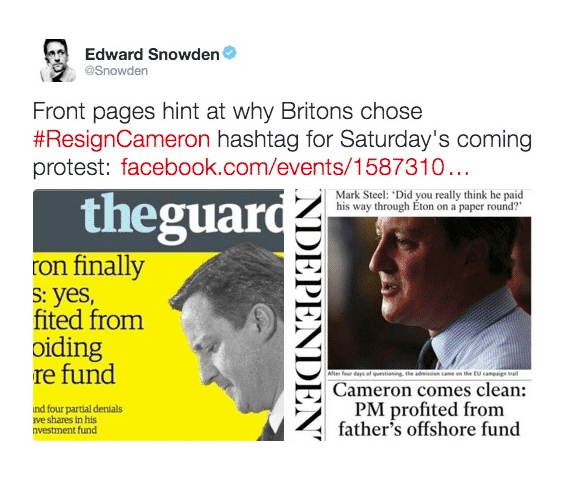
Social media is changing the way we engage with politics, but it’s also changing the way politics engages with us. Our ability to think and organize has never been better thanks to social media, but at the same time we need to acknowledge that social media is such a dream delivery mechanism for propaganda it would have made the likes of Walter Lippmann lick his lips. Social media has created an arms race between how quickly we can spread reason and how quickly the powers that be can spread emotion-fused ideology into our consciousness.
Case-study #2: Brexit
As I was finalizing this article, another historic political event occurred: Brexit – Great Britain left the European Union, and David Cameron resigned.
When I checked my Facebook feed after Brexit, I was surprised to find nearly every status expressing despair over the decision. Most of my Facebook friends are 20-35, educated, and tech-savvy.
Was the general public’s vote influenced by “outright lies” and “outlandish propaganda”?
After just a few minutes of research I found an article by Alastair Campbell, who was Director of Communications and Strategy for prime minister Tony Blair between 1997 and 2003. The article was titled This slavish Brexit propaganda would make Pravda proud. Campbell is or was a member of the executive group and has insights from behind the curtain of democracy. This is what he said about the Brexit debate:
[M]ore than in any such debate I can remember, large chunks of the press have totally given up on properly informing the public. The Mail, Sun, Express and Star in particular, and to a lesser extent the Telegraph and, on a bad day, The Times, are becoming propaganda sheets for one side of the argument…Rupert Murdoch has rediscovered his mojo and is now enjoying making sure every ounce of Sun ink is used to shape opinion in the direction he wants. Then the Barclays control the Telegraph from their Channel Island tax exile, and Richard Desmond’s Express papers feed a relentless diet of anti-EU front-page splashes as titillating and far-fetched as the stuff in the porn mags that helped create his fortune. By this bizarre collection of folk, or so they hope, “public opinion” is formed.
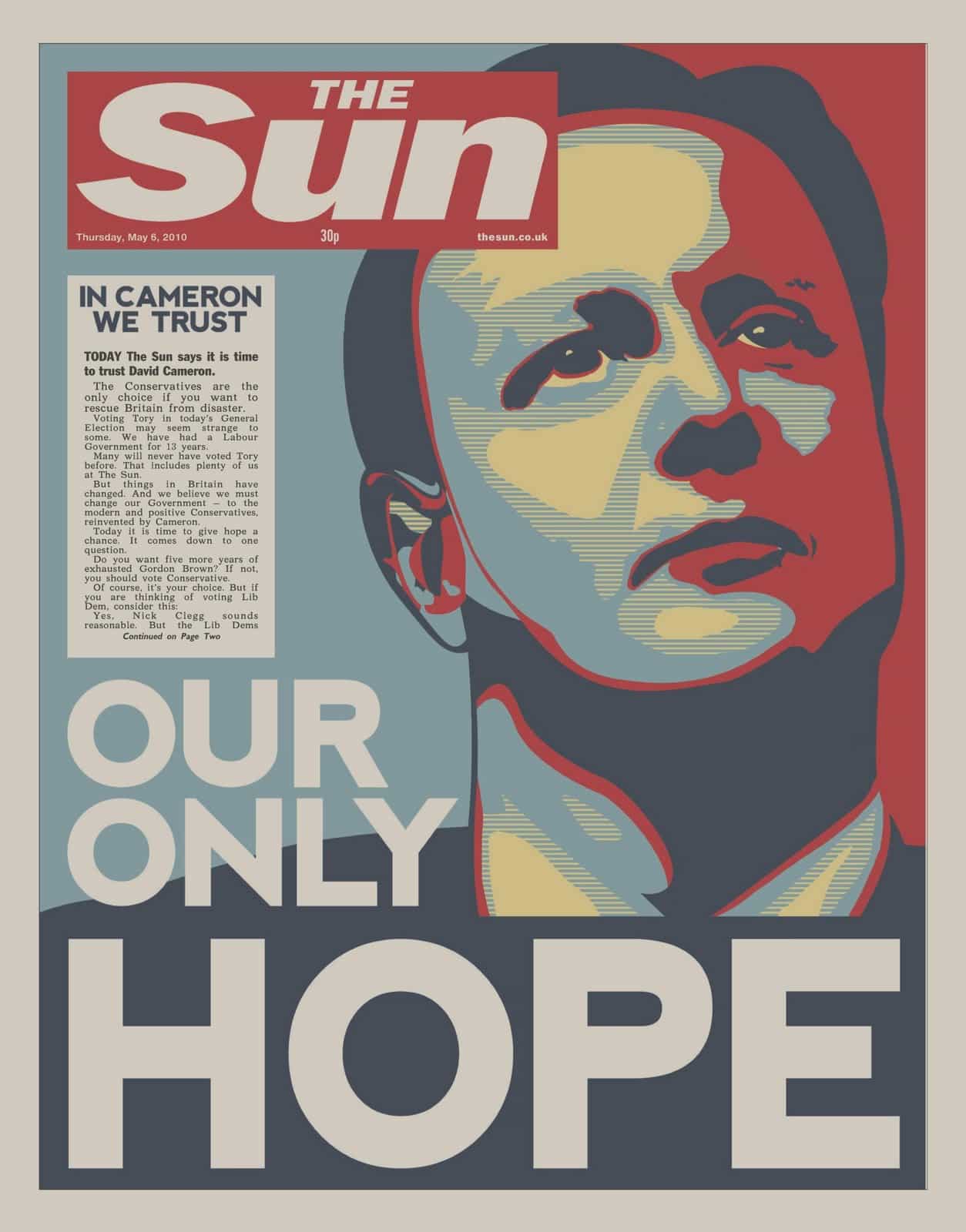
What’s most interesting about the Brexit campaign in terms of propaganda was the lack of collaboration between David Cameron and Rupert Murdoch. The Sun which is owned by Murdoch has historically always been very pro-conservative and consequently pro-Cameron.”But with Brexit, David Cameron’s policies directly opposed Murdoch’s ideals. Cameron campaigned to keep Great Britain part of the European Union while The Sun seemed to use every opportunity to steer the bewildered herd straight through the Brexit:

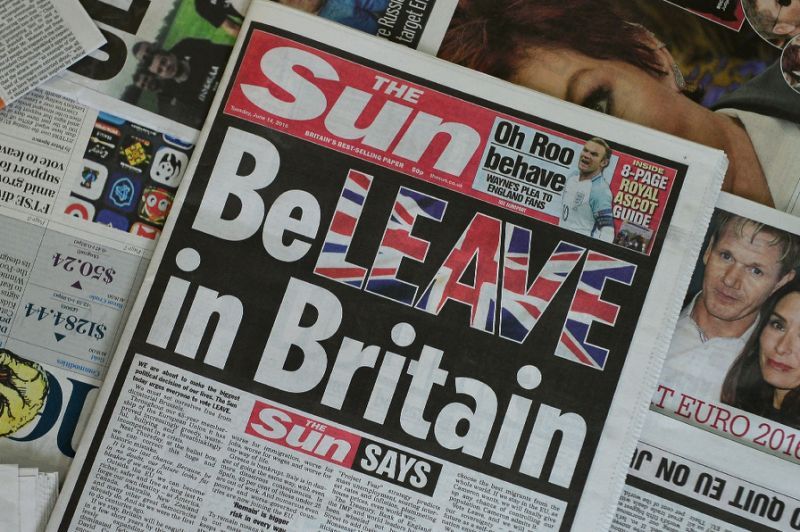
Why the sudden disagreement? I have two theories:
- Cameron thought it was in Britain’s best interest to remain part of the European Union and he decided to fight Rupert Murdoch and his media empire for the sake of integrity and doing the “right thing.”
- After being exposed in the Panama Papers leak and losing the respect of the public, Cameron struck a deal with Murdoch in which he would campaign for the Britain to stay in the EU, involve the labour leader Jeremy Corbyn, fail, ensure Corbyn’s reputation as a leader is tarnished, and resign. He would ruin Labour’s best chance at getting in at the next general election, give Murdoch exactly what he wants, and go on to pursue a prosperous career in a position of power with a little help from his special friends.
In the article How David Cameron Blew It, you can read the extent to which Cameron wanted Corbyn, the leader of the opposing party, to get involved:
Senior staff from the campaign “begged” Corbyn to do a rally with the prime minister, according to a senior source who was close to the Remain campaign. Corbyn wanted nothing to do with the Tory leader, no matter what was at stake. Gordon Brown, the Labour prime minister whom Cameron vanquished in 2010, was sent to plead with Corbyn to change his mind. Corbyn wouldn’t. Senior figures in the Remain camp, who included Cameron’s trusted communications chief Craig Oliver and Jim Messina, President Obama’s campaign guru, were furious.
So, is the dawn of dissidence coming fast enough to make a difference?
Brexit gives a pessimistic answer to this question.
I honestly don’t know, but the face that #ResignCameron came true, gives me hope.
If you want to help us combat the influence of propaganda, please share this article. The more we can educate ourselves and our peers about the mechanics of manipulation, the less power the specialized class will have over the rest of us.
[1]: Note: Media Control was published when Cameron was only twenty-five-years old, nineteen years before he became prime minister, so Media Control was not in any way written about David Cameron’s political rise.
[2]: The Sun & Cameron’s Twin Evil: Russell Brand The Trews (https://www.youtube.com/watch?v=j1QokB7lnEg) – a great analysis of propaganda, and Russell Brand explains the relationship between Rupert Murdoch and David Cameron.

Jon Brooks
Jon Brooks is a Stoicism teacher and, crucially, practitioner. His Stoic meditations have accumulated thousands of listens, and he has created his own Stoic training program for modern-day Stoics.






